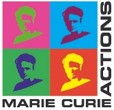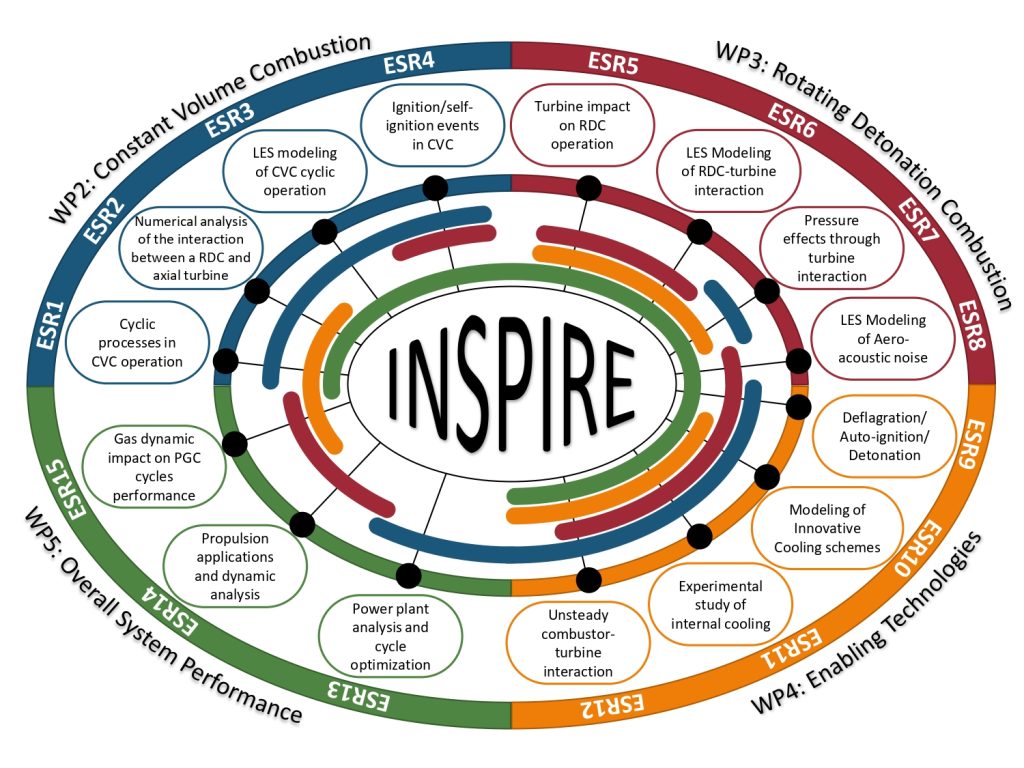The research activities of the 15 ESRs is organized into 4 technical Work Packages.
WP2 – Constant Volume Combustion.
Leader: ENSMA (Prof. M. Bellenoue)
Objectives: Combined numerical and experimental work will be dedicated to exploring the coupling of elementary physical processes involved in Piston-less CVC. Experimental tests will be performed on an industrial combustion chamber equipped with the associated intake and exhaust systems and will highlight the driving phenomena, which will be studied in detail with massively parallel combustion LES simulations and full optical access canonical combustion setup at ENSMA. The ignition phase is also a key element of such cyclic combustion processes and will be studied in detail to guide the solution for optimisation of the SAFRAN CVC combustion cycle.
Description of Work and Role of Partners:
T2.1 – [SAFRAN]: In this task SAFRAN will investigate the flow field occurring downstream an RDC combustor at real engine representative operating conditions, to verify the integration with the turbine. Associated PhD: ESR2
T2.2 – [ENSMA] ENSMA will provide a detailed database with optical measurements of flow velocity field and flame propagation in canonical CVC chamber, including the respective influence of scavenging and RBG dilution. Associated PhD: ESR1
T2.3 – [CERFACS] CERFACS will provide LES of CVC experiments of ESR1 and ESR2 including the systems used to ensure constant volume combustion (valves usually) allowing a detailed understanding of the reacting flow in a CVC configuration. Associated PhD: ESR3 and ESR1,ESR4
T2.4 – [ENSMA] Minimum Ignition Energy (MIE) determination under the influence of flow velocity and RBG dilution. Associated PhD: ESR4
WP3 – Rotating Detonation Combustion
Leader: TUB (Prof. C. O. Paschereit)
Objectives: Combined numerical and experimental work will investigate the currently identified challenges to the adoption of the RDC technology. Numerical studies will focus on investigating the coupling between the combustor and the turbine through a fully coupled LES simulation. Additionally, the outlet conditions from this simulation will be used as boundary conditions for aero-acoustic simulations focused on assessing and minimizing the combustion and aerodynamically generated noise. Experimental measurements will characterize the combustion, wave speeds, and pressure gain with integrated turbine while also providing validation for the numerical studies.
Description of Work and Role of Partners:
T3.1 – [CERFACS, TUB] CERFACS will provide a massively parallel combustion LES code which will be used for RDC flows with and without turbine. Associated PhD: ESR6, ESR8, ESR5
T3.2 – [KTH, TUB] computational aeroacoustics calculations of the RDC exhaust plume and radiated noise will be carried out for relevant operating conditions. Noise suppression technologies at the RDC outlet nozzle are to be considered and analysed by means of LES and Ffowcs Williams-Hawkings (FWH) acoustic analogy. ESR6 and ESR7 will provide data to be used as boundary conditions for validation purposes. Associated PhD: ESR8, ESR7, ESR6
T3.3 – [TUB, UC] experiments will focus on the impact of the wave direction, through the measurement of total pressure loss, for different guide vane orientations and designs. Experimental designs for implementing a preferable wave direction will be developed and integrated. Associated PhD: ESR5, ESR8
T3.4 – [TUB, CERFACS, KTH] validation experiments for T3.1 and T3.2 will be conducted in the experimental RDC combustor. Measurements of combustor pressures, wave speeds, directions, and operating mode will be compared with the LES simulations. Outlet geometries for suppression of aerodynamic generated noise will be integrated in the combustor; data to be compared with predicted values. Associated PhD: ESR6, ESR8
T3.5 – [UNIFI, TUB] experimental validation experiments for ESR10 will investigate the performance of innovative cold side convective cooling in the RDC. Associated PhD: ESR10, ESR11
WP4 – Enabling Technologies
Leader: UNIFI (Prof. B. Facchini)
Objectives: To investigate several aspects related to the integration of PGC concepts in real engines. The update of chemical kinetics data at high pressure conditions for the investigation of DDT will be studied. Issues related to turbine integration of RDC and CVC solutions will be analysed in order to optimize unsteady aerodynamic interaction. The definition of optimal cooling concepts for both combustor liners and NGV will also be pursued.
Description of Work and Role of Partners:
T4.1 – [TUB, ENSMA] Investigation of the ignition delay times in the presence of exhaust gas components at technically relevant pressures using the available high-pressure shock tube by TUB. The validity of available chemical-kinetic models will be verified using the new data, and fuels and mechanisms will be chosen for the numerical investigation of the detonation initiation in a zone of increased reactivity. Associated PhD: ESR9
T4.2 – [TUB, ENSMA] One-dimensional numerical investigation of the detonation initiation in a zone of increased reactivity caused by end-gas compression through flame propagation. Associated PhD: ESR9
T4.3 – [TUB, ENSMA] Deflagration-autoignition-detonation transition will be investigated for the selected fuels, considering different temperature gradients, in the lab facility of ENSMA. Associated PhD: ESR9
T4.4 – [UNIFI] The current state of the art, in terms of conventional cooling solutions and allowable temperature levels combustor liners, will be analysed. The goal will be then to explore a possible application of film-cooling solutions to RDC combustors. The cooling effectiveness obtained by applying multi-hole effusion cooling to RDC combustor liner will be explored by the means of high-fidelity CFD investigations, by analysing the role of the key parameters of film cooling: the CFD calculations will be carried out in the conditions adopted in the experimental tests panned in T4.5 (ESR11) with the purpose of model validation and assessment of experimental result reliability against real engine conditions. The impact of cooling air injection in the combustion chamber on the combustion process and overall pressure gain process will also be analysed. Associated ESRs: 10, 11
T4.5 – [UNIFI] This task will see the definition of an experimental approach to investigate the possible application of multi-hole film (effusion) cooling to RDC combustors. In such environment, film cooling jets will have to interact with a supersonic main flow path and its highly unsteady nature. The objective will be to define a representative not reactive test rig to analyse the development of film cooling in a supersonic main flow path. The adiabatic film effectiveness will be measured by the means of Pressure Sensitive Paint technique (slow or fast response variants) where special emphasis will be put in the compensation for large temperature variations using binary paints. Associated PhD: ESR10, ESR11
T4.6 – [POLITO] The current state of the art in terms of coupling between PGCs and HPT stages will be analysed. The most appropriate HPT stage will be selected among the ones available in the consortium. The selected stage will be studied using CFD as if it was directly coupled with the CVC using scaled unsteady boundary conditions. Associated PhD: ESR12
T4.7 – [POLITO] The exhaust section of the CVC will be designed using CFD to couple it with the HPT stage geometry. The latter will be analysed using scaled unsteady boundary conditions from the exhaust. A fully-coupled analysis of CVC/HPT will be performed using CFD to complete the interaction analysis. Associated PhD: ESR3, ESR10, ESR12
WP5 – Overall System Performance
Leader: UNIGE (Prof. A. Traverso)
Objectives: To identify the most promising layout options for PGC CC. To investigate the impact of blade cooling solutions on PGC GT simple cycles. To study and optimise PGC CC on-design thermo-economic performance. To analyse the effect of gas dynamic cross-interference on cycle performance and identify possible operational instabilities due to das dynamic phenomena. To identify the largest sources of availability destruction in the PGC cycles and propose means to minimize it. Develop a part-load performance model and a reduced order dynamic model of a PGC simple cycle gas turbine, including identification of operational limitations.
Description of Work and Role of Partners:
T5.1 – [UNIGE, CERFACS, TUB, UNIFI] PGC power plant analysis and cycle thermo-economic optimisation. ESR13 will gather from all partners information to be integrated in developing this task. Associated PhD: ESR13, ESR14, ESR10
T5.2 – [UNIGE, CERFACS, TUB] PGC propulsion application with part load and dynamic analysis ESR14 will develop this task. Associated PhD: ESR14, ESR13, ESR15
T5.3 – [TUB] Development of the highly dynamic gas turbine model, based on the 1-D Euler equations. ESR15 will carry out this task and perform the subsequent studies by applying the resulting model. Associated PhD: ESR15,ESR13, ESR14


